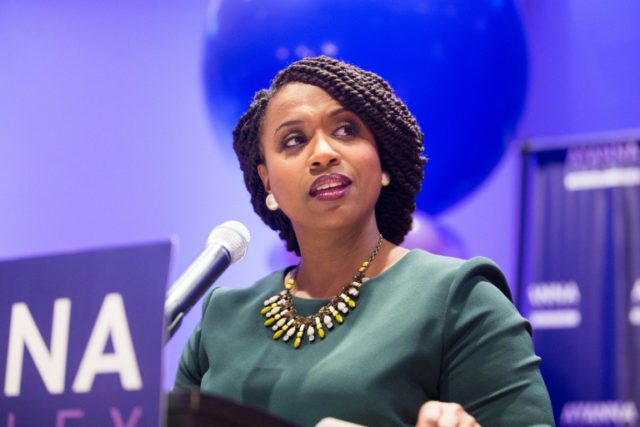New York (AFP) – An African American woman’s defeat of a male 20-year veteran of Congress is the latest sign that Democratic Party faithful are pushing left and want fresh faces to lead the fight against President Donald Trump.
Ayanna Pressley, 44, who was already the first woman of color elected to Boston City Council, is now poised to become the first African American elected by Massachusetts to the US House of Representatives.
She defeated Michael Capuano, 66, who has served 10 consecutive terms in a storied district that John F. Kennedy once represented and which today is the only majority non-white district in the northeastern state.
Pressley, a seasoned political operator who worked for Kennedy’s nephew, ran on a ticket of change, making an asset out of her life experience as the survivor of rape, and whose father battled drugs and spent time in prison.
Her win drew comparisons with that of political novice Alexandria Ocasio-Cortez, who toppled Democratic Party grandee Joe Crowley in a similarly left-leaning, majority non-white, safe seat in New York.
“This is real. This is not something you want to ignore if you are running for public office in this country in 2018,” said Ester Fuchs, political science professor at Columbia University. “There is an insurgent political movement.”
Ocasio-Cortez and Pressley are minority women championing working-class roots, who unseated older, white men out of touch with diverse constituents fired up by the Trump presidency and fed up with the Democratic Party status quo.
Without party machinery behind them and substantial war chests, they proved that a compelling message and social media proficiency — ironically Trump style — is enough to connect to voters and become an insurgent winner.
Visceral opposition to the Trump presidency, the #MeToo movement, the rise of BlackLivesMatter and the anti-gun lobby is giving rise to more progressive, more women and more minority candidates, analysts say.
District demographics are changing. Race and women’s rights and empowerment have emerged as flashpoint issues in the Trump era. Identity politics in America are increasingly important.
“It’s people who look and sound like them — that’s what voters were looking for this time,” says Debbie Walsh, director of the Center for American Women and Politics at Rutgers University.
– ‘Authenticity’ –
“There is a gender component, a race ethnicity component but it’s really about new faces and faces that may better represent their district.”
Of 80 black women who started out on the ballot for Congress at the beginning of the year, 41 have won their primaries with one more still to come. Of five black women who ran for governor, only one — Stacey Abrams — won her primary.
Social worker Rashida Tlaib and former Somali refugee Ilhan Omar won Democratic primaries in Michigan and Minnesota respectively, putting them on course to become the first Muslim women elected to Congress.
“So many voters are really looking for an authentic voice and someone they can really trust,” said Kimberly Peeler-Allen, co-founder of Higher Heights, an organization that works to help get black women elected.
“That trust and authenticity comes when they know they have a shared experience,” she told AFP.
But if the 2018 midterm elections have seen a record number of women and minority candidates, analysts expect the November campaign to be fought from the left and the right, rather than over center ground.
In Florida, for example, Bernie Sanders style democratic socialist Andrew Gillum is competing for governor against Trump-supporting Ron DeSantis.
“What we’re seeing is a real difference between Republicans and Democrats,” says Jeanne Zaino, political science professor at Iona College.
“I don’t think we’re going to see candidates move to the center this year… it will be Bernie Sanders vs Donald Trump in some of these federal and state races,” she said. “It’s going to be fascinating.”
But it remains unclear whether Democrats can win back control of Congress, not to mention whether progressive wins in Democratic primaries will be replicated at the general election in November.
“Will this translate to a national blue wave? Probably not because you’ll only see a few places in the country where people can organize like this,” said Samuel Abrams, a political scientist at Sarah Lawrence College.

COMMENTS
Please let us know if you're having issues with commenting.